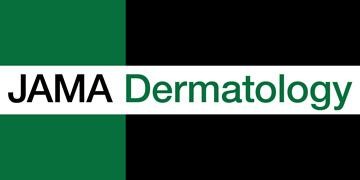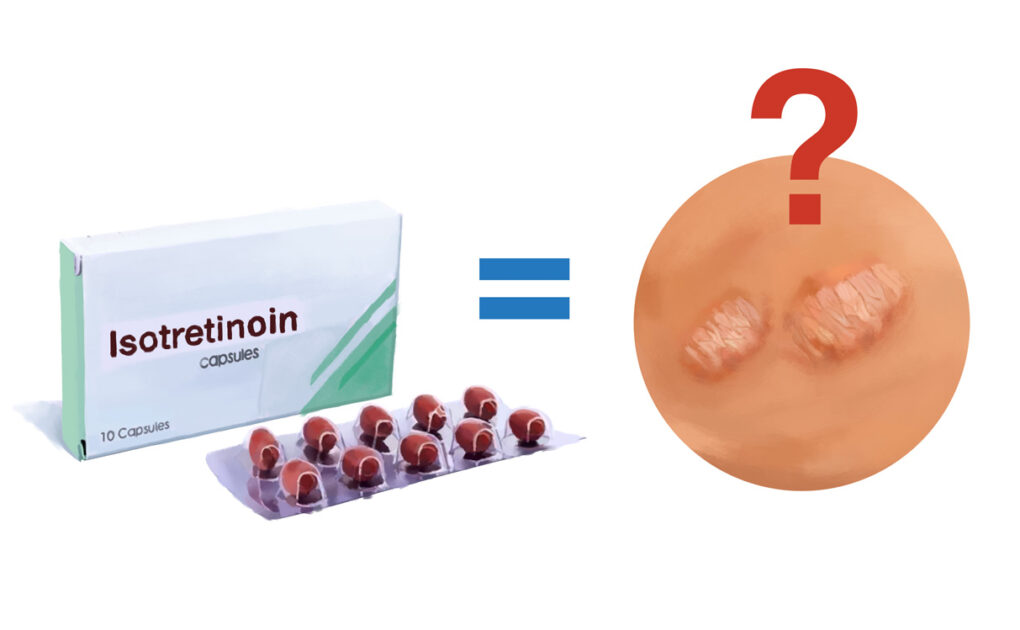Probably Not, but to Be on the Safe Side, Consider Avoiding Invasive Procedures like Ablative Laser Treatment and Dermabrasion until You’ve Been off Isotretinoin for 6-12 Months

The Essential Info
Raised scars, or scars that stick out above the surrounding skin, sometimes form when the skin heals from acne lesions or from other types of injuries.
Several case reports from the 1980s and 1990s raised the concern that people who take oral isotretinoin (Accutane®) may be more prone to developing raised scars. These reports suggested that some people developed raised scars from:
- Simply taking the drug
- Undergoing dermatological procedures while on the drug
When it comes to simply taking the drug, recent research has found no connection between taking oral isotretinoin and the formation of raised scars.
However, the jury is still out on whether dermatological procedures like laser therapy while on isotretinoin might cause raised scars. The evidence so far suggests that most dermatological procedures are likely safe to undergo while on isotretinoin. However, some procedures, like ablative laser treatment and mechanical dermabrasion, are best avoided until 6-12 months have passed since stopping isotretinoin. Most experts agree that this is a decision that a doctor and patient should make together on an individual basis.

The Science
- The Old Case Reports That Triggered the Concerns
- New Studies Suggest the Risk May Be Exaggerated
- The Verdict
The idea that isotretinoin might cause raised scars dates back to a few case reports from the 1980s and 90s.1-5 These reports described people who took isotretinoin for their acne and developed keloid scars, a less common type of large raised scar. In some people, one or more acne lesions that healed ended up leaving a keloid scar after they started taking isotretinoin. In others, keloid scars appeared after going through dermatological procedures like laser treatment or dermabrasion while on isotretinoin.5
Two recent studies have found no connection between taking isotretinoin and developing raised scars. However, these new studies were relatively small, with a grand total of just under 300 patients. Therefore, it is possible that there is still a connection between isotretinoin and raised scars in a small fraction of cases, and that these new studies simply missed it.
Some experts have noted that with dermatological procedures becoming safer and less invasive, complications like raised scarring are less common than in the past. Therefore, the old recommendation to delay such procedures until you have been off isotretinoin for 6-12 months may be overcautious in some cases.5

Today, most experts recommend talking to your doctor about the pros and cons of performing a dermatological procedure now versus waiting until you have been off isotretinoin for 6-12 months. The decision should be made on an individual basis and take your skin color into account, because patients with non-Caucasian or darker skin are generally more prone to raised scars.5,6 However, some experts recommend that if possible, invasive procedures like non-fractional ablative laser treatment and mechanical dermabrasion should be avoided while on isotretinoin and for 6-12 months afterward you stop taking isotretinoin.4
The Old Case Reports That Triggered the Concerns
Several case reports published in the 1980s and 1990s described keloid scarring in patients who took isotretinoin. Three patients developed keloid scars while simply taking isotretinoin:
- A 16-year-old boy took oral isotretinoin at a dose of 0.5 mg/kg/day and developed keloids on the trunk (chest and/or back).
- A patient with nodulocystic acne and another inflammatory skin disease called Behcet’s began taking oral isotretinoin at a dose of 40 mg/day and developed numerous keloids on the trunk after 8 weeks.
- One out of 21 patients in a study on oral isotretinoin developed keloid scars while taking the drug.5
In addition, three patients developed keloid scars after undergoing dermatological procedures while on oral isotretinoin:
- One patient received argon laser treatment while taking isotretinoin and developed keloid scars on the cheek 8 weeks after the laser treatment.
- One patient underwent dermabrasion (removal of the top layers of skin under anesthesia) while taking isotretinoin and developed keloids 8 weeks after the dermabrasion treatment.
- One patient underwent dermabrasion while taking isotretinoin and developed keloids 6 months after the dermabrasion treatment.5
Based on these reports, the medical community made the recommendation that people wait to undergo dermatological procedures like laser treatment and dermabrasion until 6-12 months after taking the last dose of isotretinoin.
New Studies Suggest the Risk May Be Exaggerated
Two new studies have tried to assess the risk of developing raised scars either from taking isotretinoin by itself or from taking isotretinoin and undergoing dermatological procedures at the same time.
Study #1
The first study aimed to determine whether people taking isotretinoin are more likely to develop raised scars than those who don’t take isotretinoin.
The researchers found no connection between taking isotretinoin and developing raised acne scars.1 We should note that the study included fewer than 200 people–in other words, it was relatively small.
Expand to read details of study

The study was published in the International Journal of Dermatology in 2016. The researchers looked at two groups of acne patients:
- Treatment group: 122 patients who took oral isotretinoin at a dose of 10-60 mg/day
- Control group: 66 patients who did not take oral isotretinoin
The researchers found no significant difference between the two groups in the percentage of people who developed raised scars. In other words, about the same percentage of those who took isotretinoin and those who didn’t take isotretinoin ended up with raised scars.
The researchers speculated that whether or not a person develops raised scars from acne depends on their body’s individual response to inflammation rather than on whether they take isotretinoin. However, they cautioned that more research is necessary to better understand how isotretinoin might affect the healing of acne lesions.1
Study #2
The second study looked at whether people who undergo invasive dermatological procedures while on oral isotretinoin are more prone to raised scars than people who undergo such procedures but don’t take isotretinoin.
In the study, no one who underwent invasive dermatological procedures while taking isotretinoin developed raised scars.3 However, this study also included fewer than 200 participants.
Expand to read details of study

This study was published in the same journal in 2014. The researchers looked at acne patients who underwent either invasive acne scar treatments (Dermaroller, CO2 laser, or microneedling radiofrequency) or laser hair removal. The patients in the study were divided into two groups:
- Treatment group: 55 patients who took oral isotretinoin at a dose of 0.5 mg/kg/day for their acne but used no topical medications
- Control group: 55 patients who did not take isotretinoin and only used topical medications for their acne
In both groups, each patient underwent 4 sessions of one of the four invasive treatments at intervals of 6 weeks. The researchers then examined the patients and took photographs of their skin to assess any side effects like raised scars or delayed skin healing. They found that neither group developed any raised scars. The scientists wrote, “Atypical scarring, delayed wound healing, keloids, or hypertrophic scars were not observed in any patient.”3
The results of this study suggest that today, invasive dermatological treatments may not necessarily be incompatible with taking isotretinoin. However, the researchers cautioned that the study was relatively small, and more research is needed to confirm its findings.
To sum up, both new studies suggest that the risk of raised scars from taking isotretinoin may be exaggerated. However, these are still only two relatively small studies, so it’s too early to fully dismiss all concerns about isotretinoin and raised scars.
The Verdict
Should you avoid isotretinoin for fear of developing raised scars?
As long as you’re not undergoing invasive procedures, raised scars are probably not an issue you need to worry about when deciding whether to take oral isotretinoin. Currently, there is no convincing evidence that isotretinoin by itself causes raised scars. However, isotretinoin is a powerful drug with a variety of side effects, so it’s important to weigh the pros and cons before starting treatment.
Is it safe to undergo dermatological procedures like dermabrasion while on oral isotretinoin?
When it comes to undergoing dermatological procedures like laser treatment or dermabrasion while on isotretinoin, experts give contradictory advice.

One group of researchers combed through 32 studies published over a 35-year period to try to resolve this question. They reported their findings in the journal JAMA Dermatology in 2017.4 The researchers concluded that:
- Most procedures may be safe to undergo while on isotretinoin: According to the article, the following procedures are likely safe to undergo while receiving isotretinoin or after having recently completed treatment with isotretinoin:
- Manual dermabrasion (where the cosmetic surgeon removes the top layers of skin by hand using sterile sandpaper)
- Superficial chemical peels
- Skin (cutaneous) surgery, such as plastic surgery on the face or surgical treatment for acne scars
- Laser hair removal
- Fractional laser treatment
- Two procedures are not recommended while on isotretinoin: According to the article, mechanical dermabrasion (where the cosmetic surgeon removes the top layers of skin using a motorized wire brush) and non-fractional ablative laser treatment should be avoided or delayed for people who are taking isotretinoin or have recently completed a course of isotretinoin treatment. The researchers wrote, “Based on the available literature, mechanical dermabrasion and fully ablative laser are not recommended [during] systemic isotretinoin treatment.”4
However, another group of researchers came to a different conclusion.

According to a review article published in the Indian Journal of Dermatology, Venereology and Leprology in 2019, the recommendation to avoid or delay dermatological procedures while on isotretinoin is outdated. The review authors wrote, “[T]he recommendation has only served to deny patients…safe treatments and put unnecessary fear in the minds of doctors.”5
The authors of the review noted that the recommendation is based on a few old case studies, when technologies like laser therapy were still in the early stages of development. These technologies are safer now, and patients may benefit from undergoing procedures earlier rather than waiting until 6-12 months after finishing isotretinoin treatment. The review authors recommended that patients have a discussion with their doctor and make an informed decision together.5
A third group of researchers agreed that the decision to undergo dermatological procedures while on isotretinoin is one doctors should make with their patients on a case-by-case basis.

According to a systematic review published in the Journal of Cutaneous Medicine and Surgery in 2017, there is not enough evidence to decide once and for all whether dermatological procedures are safe for patients who are taking isotretinoin. Therefore, doctors need to look at each individual patient’s case and weigh the benefits against the risks.
The review authors also noted that the case reports published so far featured Caucasian patients who were on isotretinoin. However, it is known that non-Caucasians are more prone to raised scars than lighter-skinned people. Therefore, the review authors cautioned that the case studies done so far may have underrepresented non-Caucasian people. With this in mind, doctors need to be particularly careful in recommending dermatological procedures to non-Caucasian patients who are on isotretinoin.6
On balance, it may be wisest to avoid particularly invasive procedures like non-fractional ablative laser treatment and mechanical dermabrasion while on isotretinoin and for 6-12 months afterwards. When it comes to other, less invasive procedures, talk to your doctor about what might be best in your individual case.
How Raised Scars Form
The skin contains an important protein called collagen, which makes the skin firm and flexible. When the skin heals from any type of wound or injury, including an acne lesion, some of the old collagen is broken down, and new collagen is formed to replace it. Scars result when there is an imbalance between the breakdown and formation of collagen:
- Raised scars: Raised scars result when the formation of collagen outpaces its breakdown, creating too much skin tissue. Raised scars are less common than indented scars. There are two types of raised scars that can occur:
- Hypertrophic scars: Hypertrophic scars stay within the margins of the original wound.
- Keloid scars: Keloid scars grow beyond the original wound area.
- Indented (atrophic) scars: Indented scars result when the breakdown of collagen outstrips its formation, creating an indented or sunken-in area of skin. Indented scars are much more common than raised scars.1,7
What Is Isotretinoin, and How Does It Work?
Isotretinoin is a derivative of vitamin A. It is a drug sold under the brand name Accutane® for treating severe cystic acne.8 Isotretinoin improves acne by:
- Reducing production of skin oil: Excessive skin oil production is one of the first steps in the development of acne.
- Inhibiting the growth of acne bacteria: The acne bacteria C. acnes feed on skin oil and tend to overgrow when there is too much skin oil. By reducing skin oil production, isotretinoin reduces the growth of these bacteria.
- Normalizing shedding of dead skin cells: The abnormal accumulation of dead skin cells leads to pore clogging and can also be an early step in acne.
Isotretinoin can achieve dramatic improvements in acne and is therefore a valuable weapon in doctors’ arsenal. By curtailing the development of severe acne lesions, isotretinoin also reduces the chances of acne scarring.1
However, isotretinoin also comes with numerous side effects. While most side effects are temporary and manageable, some can be serious and lifelong. Therefore, it is not a treatment to embark on lightly.1
Because of its side effects, doctors typically prescribe isotretinoin only for severe acne and only after other treatments have failed. If you’ve tried multiple other treatments and your doctor is now recommending isotretinoin, there is likely a good reason.
How isotretinoin might cause raised scars: It is unclear exactly how isotretinoin might cause raised scars, if, in fact, it does so. Some scientists speculate that isotretinoin might stimulate the formation of new blood vessels while simultaneously inhibiting the breakdown of collagen, resulting in the buildup of excess collagen.1
References
- Guadanhim, L. R., Gonçalves, R. G. & Bagatin, E. Observational retrospective study evaluating the effects of oral isotretinoin in keloids and hypertrophic scars. Int J Dermatol. 55, 1255-1258 (2016). https://pubmed.ncbi.nlm.nih.gov/27419807/
- Espinosa, N. I. & Cohen, P. R. Acne vulgaris: A patient and physician’s experience. Dermatol Ther (Heidelb). 10, 1-14 (2020). https://pubmed.ncbi.nlm.nih.gov/31701473/
- Chandrashekar, B. S., Varsha, D. V., Vasanth, V., Jagadish, P., Madura, C. & Rajashekar, M. L. Safety of performing invasive acne scar treatment and laser hair removal in patients on oral isotretinoin: a retrospective study of 110 patients. Int J Dermatol. 53, 1281-5 (2014). https://pubmed.ncbi.nlm.nih.gov/25039864/
- Spring, L. K., Krakowski, A. C., Alam, M., Bhatia, A. et al. Isotretinoin and timing of procedural interventions: A systematic review with consensus recommendations. JAMA Dermatol. 153, 802-809 (2017). https://pubmed.ncbi.nlm.nih.gov/28658462/
- Mysore, V., Omprakash, H. M. & Khatri, G. N. Isotretinoin and dermatosurgical procedures. Indian J Dermatol Venereol Leprol. 85, 18-23 (2019). https://pubmed.ncbi.nlm.nih.gov/29998863/
- McDonald, K. A., Shelley, A. J. & Alavi, A. A systematic review on oral isotretinoin therapy and clinically observable wound healing in acne patients. J Cutan Med Surg. 21, 325-333 (2017). https://pubmed.ncbi.nlm.nih.gov/28362520/
- Connolly, D., Vu, H. L., Mariwalla, K. & Saedi, N. Acne scarring-pathogenesis, evaluation, and treatment options. J Clin Aesthet Dermatol. 10, 12-23 (2017). https://pubmed.ncbi.nlm.nih.gov/29344322/
- Forbat, E., Ali, F. R. & Al-Niaimi, F. Dermatological indications for the use of isotretinoin beyond acne. J Dermatolog Treat. 29, 698-705 (2018). https://pubmed.ncbi.nlm.nih.gov/29480033/
 Acne.org Products
Acne.org Products